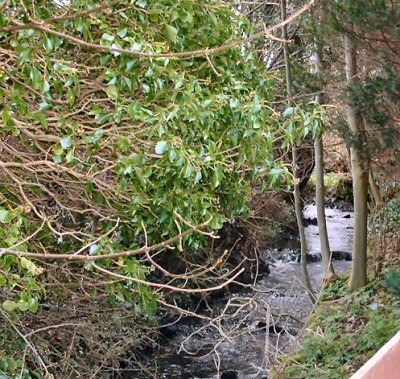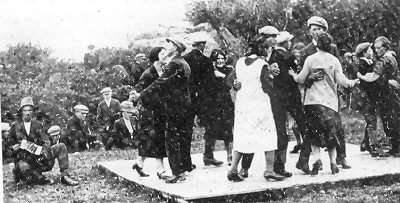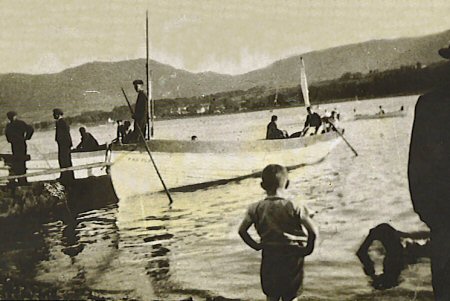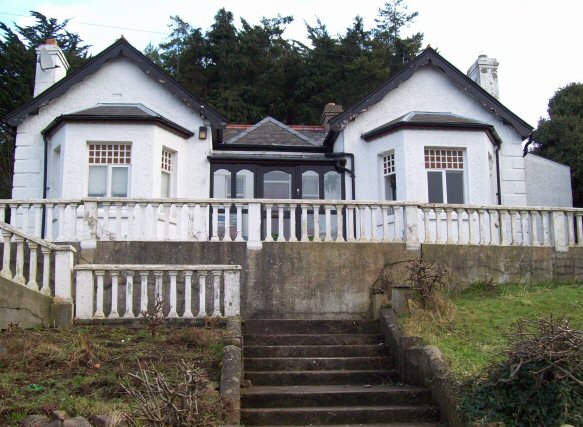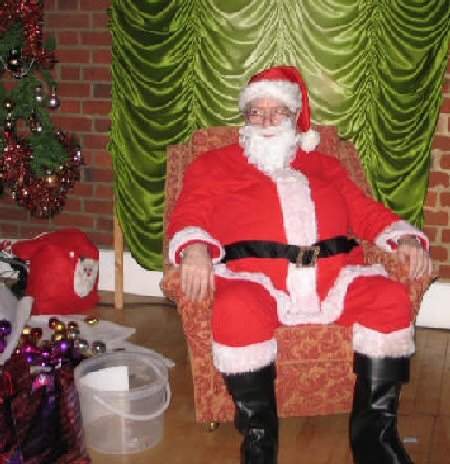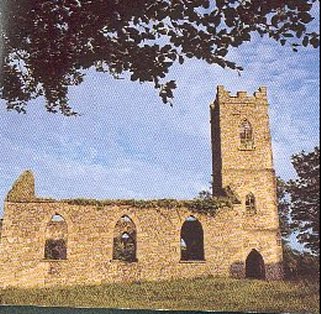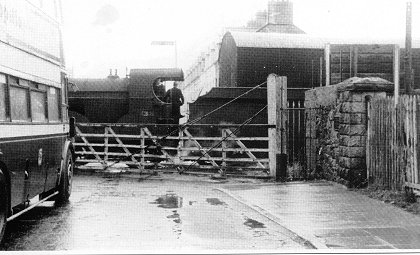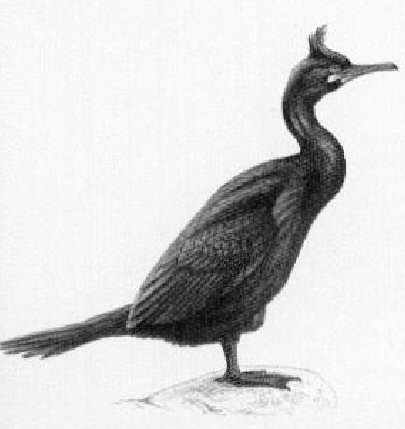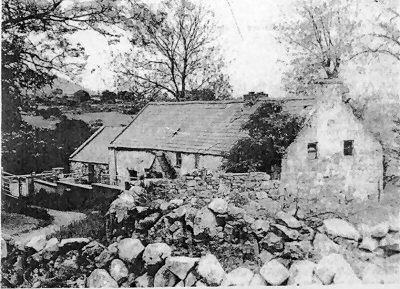Slabber a foolish talker, dirty person, wet day
Culture
Crossroads Dances
Petie had no memory of Road Bowls or ‘Bullets’ from the Thirties though County Armagh has a strong tradition in this field of sport.
Drowned in the Locks
There was a husband and wife one time lived down along the Fathom Line near till the Locks there where the ships would put in.
Anyway didn’t they have the tarribl’ fallin’-out one day, so bad that yer man said he wanted till end it all and throw he’sself into the Canal across the way.
Ghostly Horse Rides Again
I earlier mentioned that the life and fortunes of Dostoyevsky – and one of my own line – was ruined from gambling. This is a tale of a Planter of these parts who ruined himself from the same addiction.
William Fivey of Lisnabrague Lodge, near Poyntzpass owned land both there and at Killycomain (near Portadown). The Ordnance Survey Report for 1837 shows that he leased land in parcels of 3-15 acres at 25s-28s per acre for the former location and at 10-20 acres at 20s-40s an acre at the latter. He was a very wealthy man and also had a lime kiln and several mills.
However he was a profligate gambler and owned several racehorses. Over a period of time he experienced much ill-luck and soon was in dire financial straits. He decided to gamble everything on one final fling.
He owned one particular racehorse in which he had undying faith. He prepared and trained it well and entered it for a race he felt certain it must win. He gambled all the money he had left in the world on the outcome.
It lost. Fivey in fury took the horse home and stabled it. Then he had the stable door bricked up and the horse starved to death.
By 1850 Fivey was forced to sell all his horses and his furniture to meet gambling debts. In the end he had to let Union Lodge to a Doctor Saunderson.
To this day a ghostly horse is said to gallop up the avenue on moonlit nights from time to time. There are those who would deliberately avoid the area then.
Yuletide Customs
Just to keep you on the right side this Yuletide, remember NOT to
take down the Christmas decorations before Jan 6th (the 12th day)
put up a New Year’s calendar before Jan 1st
Fews Glossary: S 2
Scut a mean person, term of abuse to younger person
Seasoned old
Sensible wise, ‘make me sensible’, explain to me
Seep soak, ‘seeping wet’
Sets seed potatoes
From Irish, Placenames
The many explanations of the Gaelic derivation of local place names is often a cause of exasperation. That we cannot be prescriptive is a testimony of the name’s antiquity; it also reflects on the possibilities of both languages; and it frequently tells of our diverse history and demonstrates that no matter who we are, we share a common rich heritage. Here are just two examples that we have recently referred to.
The village of Forkhill, recently featured (and about to get another article!) lies beneath Slieve Gullion’s tail. Older residents say ‘Far – cill’. Some believe it refers to an ancient clan, Orcaill. Others suggest it comes from the Gaelic for Cold Wood, and indicate that the famous and ancient Dunreavy Wood ended at the village.
I have been told its derivation is from a Gaelic word referring to a water course or ‘trough’. Personally I suspect it might derive directly from ‘Church of the Men’ as we have Church of the Priest (Kilnasaggart) and Church of Women (Kilnaman) too.
But merely contemplating these alternatives causes us to remember ancient clans and their names; to recall that until a few short centuries ago, our land was covered in forests, and to remember tales associated with Dunreavy Wood; to consider the river, lakes and unique water features of the area and how they were developed in the past; and to accept the central role of religion and particularly Christianity in the last two millennia.
And Slieve Gullion itself. The term in English refers to a body of still water in a ‘gully’ possibly and may refer to the lake on the mountain top.
It may however derive from the Gaelic for ‘holly’ with which the mountain was once covered.
It may derive from Cullain, the smith to the court of Conor McNessa and the Red Branch Knights; or to Cuchullain whose greatest exploits happened in this vicinity and whose name means Hound of Cullain.
I have also heard it suggested that the clouds and mist that frequently cover its top may have brought about a name that could possibly derive from the Gaelic ‘to cry’; and again, that verb along with the name of that other hero, Fionn (MacCool).
So, how many tales, legends and stories of folk history does that conjure up?
Let’s just celebrate our diversity and the richness of our common history!
Is the aul’ hen dead?
There was a beggar woman of old of these parts who had lost her arms in a flax-beetling mill accident. (Beetling was a process where large and heavy wooden paddles were made to batter the linen cloth to smooth and shine it). There were no compensation laws then. Tramping the countryside she would have eaten haws from the hedge as she went along, being able to pull them off with her mouth. She was heart-scared of dogs, being unable to protect herself from them.
Charitable people would take her in, feed, clothe and bathe her.
Other tramps were Red Margaret, Praying Biddy, Susie the Shoot and The Green Shawl Woman. Mary Kelly was a tiny, old woman who wore a black cape. Like Biddy Ardee they had bags and pockets to carry their little ‘charities’. Soncy Mary dealt in cures especially for animals.
Tramps at the door then might ask for money or a ‘grain of meal’. A penny was enough to satisfy them, or bread or sugar or meal. This went into their bag. People kept a little ‘yalla male’ or maize (that ‘pigeon grain’ imported cheaply from America during the Famine) for this purpose.
Daniel Murnaghan was noted for repeating The Lord’s Prayer as he tramped along. Jack the Flute did this also. He was called for the instrument he was heard to play. He was known to run a piece, then stand and look around the countryside talking to himself.
An old tramp was taken in to a big house once where he’d occasionally get a ‘piece’ and a mug of tea. He was brought to the scullery of course and when seated in the charge of the sarvant girl, the lady of the house went off about her business. There had been a ‘party’ entertained there the night before and the tramp was astonished to find a chicken leg between the boords of his ‘piece’. Suspicious at such unknown largesse, he beckoned the girl to him and asked a whispered question:
‘Tell me Biddie’, says he, ‘whatever happened to the oul’ hen?’
Mummers Story
The Mummers tradition, I am told, was brought here with the Planters and might still be experienced in England’s South-West counties. Rose McKeown of Sheetrim tells me they were still doing the rounds in that vicinity up to the early Sixties. She has that character too as Wee Dibbley Doubt.
They would cover an area of about five miles circumference. This group had a French Fiddle (harmonica) for accompaniment and sang the popular songs of the time. Besides the characters aforementioned she remembers King George. They would perform in the kitchen, never getting access to ‘The Room’ which was far too grand for them! The gloom of the old oil lamp added to the air of mystery!
At some houses they would get nothing and at others they might get as little as a sixpence, though half-a-crown was common. By then they were primarily interested in the money. She remembers giving a ten-shilling note. She tells of one disguised figure commenting on her new Cuckoo Clock. These were imported from Germany and hers was purchased above in ‘Cross (Carrickmacross) by her husband for seven pounds and ten shillings; a fortnight’s wages then. Naturally she was very proud of it and it ‘cuckoo-ed’ non-stop for nigh on twenty years.
Anyway when yer man commented on the clock he used her first name and an undisguised voice. She recognised him as a former ‘flame.’ Perhaps that accounted for the generosity!
But I was trying to complete the script!
CROMWELL
Here comes I, Sir Oliver Cromwell. As you may suppose
I have conquered many nations with my long and copper nose
I have caused my foes to tremble, and all my enemies to quake
Sure I bate me own companions till they were no longer fit to spake.
I shot the devil through a reel
And through an oul’ spinning wheel
Through a bag of pepper
Through a horse-shoe cocker.
Such a man was never known
And if you don’t believe the words that I say
Enter in Saint Patrick and he will clear the way.
SAINT PATRICK
Here comes I Saint Patrick in my shinin ‘ armour bright
I was once a noble champion, but now a worthy knight
I fed my sheep on oats and hay
And after that I ran away
If you don’t believe the words that I say
Enter in Beelzebub and he will clear the way.
BEELZEBUB
Here comes I Beelzebub
And over me shoulder I carry a club
And in me hand, a dripping-pan
And I count myself a jolly fine man.
And if you don’t believe the words that I say
Enter in Big-Bellied Ned and he will clear the way.
NED
Here comes I Big-Bellied Ned
If ye can’t give me money give me plenty of bread
For when I was young I was not well-fed
But now they call me Big-Bellied Ned.
If you don’t believe in the words that I say
Enter in Big Head and he will clear the way.
BIG HEAD
Here comes I that niver come yit
Big Head and little wit
The more me head’s so big, the more me body’s small
But I’ll do me best to plaze ye all
And if you don’t believe the words that I say
Here comes Wee Divil Doubt and he’ll clear the way.
DIVIL DOUBT
Here comes I, wee Divil Doubt
If ye don’t give me money I’ll sweep ye all out
(my mother has this line…The tail of me shirt is hanging out..)
Money I want and money I crave
If you don’t give me money I’ll sweep ye till your grave.
And if you don’t believe in the words that I say
Enter in Johnny Funny and he will clear the way.
We have earlier quoted Johnny Funny’s lines and the final chorus.
End…
